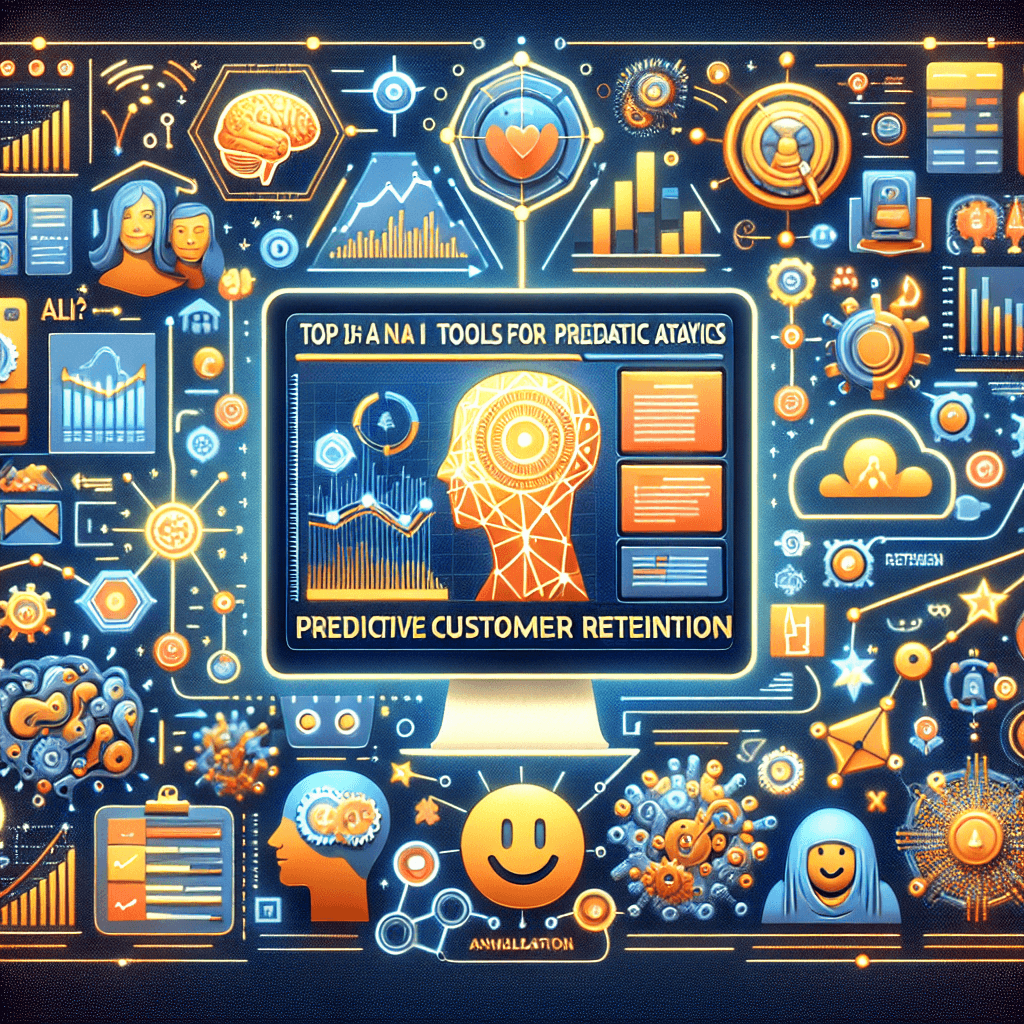Introduction to Predictive Customer Retention
In today’s competitive business landscape, customer retention has become a pivotal focus for companies striving for long-term success. Predictive customer retention leverages advanced analytics and artificial intelligence (AI) to anticipate when customers are on the verge of churning and to identify methods for keeping them engaged. The rise of AI tools in this arena has empowered organizations to tailor their strategies, ensuring they not only survive but thrive in a fast-evolving marketplace.
Understanding Predictive Analytics in Customer Retention
Predictive analytics involves the use of statistical algorithms and machine-learning techniques to identify the likelihood of future outcomes based on historical data. In terms of customer retention, this means analyzing past behaviors, preferences, and interactions to forecast churn rates and develop targeted interventions. By harnessing these insights, businesses can design proactive measures that foster loyalty and boost customer lifetime value.
The Role of AI in Enhancing Customer Experience
AI plays a transformative role in enhancing customer experience, offering personalized interactions that can significantly improve retention rates. By utilizing AI models, businesses can not only analyze vast amounts of data but also predict customer needs and preferences more accurately than ever before. This level of personalization is key to establishing a deeper emotional connection with customers, leading to sustained loyalty.
Top AI Tools Revolutionizing Customer Retention
With a plethora of AI tools available, businesses have numerous options to choose from. Here, we highlight some of the most effective tools for predictive customer retention:
Salesforce Einstein
Salesforce Einstein is an AI-powered analytics tool that integrates seamlessly within Salesforce’s robust CRM platform. By leveraging machine learning algorithms, it helps businesses ascertain which customers are at risk of leaving, enabling proactive engagement strategies.HubSpot
Known for its marketing automation, HubSpot’s AI-driven features offer predictive lead scoring, allowing businesses to identify potential churn risks. With insights into customer behavior, HubSpot enables teams to tailor their messaging and interventions.Gainsight
Primarily focused on customer success, Gainsight uses predictive analytics to help organizations understand customer health scores and potential churn factors. The platform delivers actionable insights and facilitates engagement strategies that enhance customer loyalty.ChurnZero
ChurnZero empowers businesses by providing real-time insights into user engagement. Its AI algorithms analyze account activity and generate alerts when customers show signs of disengagement, allowing teams to take swift action.Intercom
Intercom offers a conversational experience platform that analyzes customer interactions to predict churn. Through its intelligence features, it can suggest targeted engagement tactics and automate responses to improve retention rates.Zendesk
As a customer service platform, Zendesk employs AI to track customer interactions and sentiment. By comprehensively analyzing this data, it can provide recommendations for re-engagement, reducing churn through timely support.Statista
Although primarily a data analytics platform, Statista employs predictive analytics for various sectors, allowing businesses to interpret customer trends and behaviors effectively. By utilizing their insights, organizations can tailor retention strategies more effectively.- Acquia
Acquia specializes in digital experience management and utilizes AI to tailor customer interactions and predict future behaviors. Its tools enable companies to design personalized experiences that resonate with clients.
The Benefits of Adopting AI Tools for Customer Retention
Utilizing AI-driven tools for predictive customer retention comes with a multitude of benefits. First and foremost, these tools enable businesses to gain a comprehensive understanding of their customers, creating tailored experiences that enhance engagement. Additionally, they help organizations identify at-risk customers early, allowing for timely intervention.
Furthermore, AI tools streamline processes by automating routine tasks, thus freeing up human resources for more complex decision-making. They also foster data-driven strategies, leading to informed business decisions that align with customer needs.
Challenges Businesses Face in Implementation
Despite the immense benefits that predictive analytics offers, businesses encounter several challenges in the implementation phase. Data privacy concerns are at the forefront, as companies need to adhere to regulations surrounding customer information. Moreover, organizations may struggle with data silos, where information is trapped in disparate systems, making it difficult to derive cohesive insights.
Talent acquisition is another hurdle, as businesses often require skilled data scientists and analysts to interpret complex datasets. Not investing in the right talent can undermine the effectiveness of AI tools.
Real-World Success Stories of Predictive Customer Retention
Several businesses have exemplified the power of predictive customer retention through their success stories. For instance, a renowned e-commerce platform implemented Salesforce Einstein’s predictive features, resulting in a 30% reduction in churn rates within six months. By analyzing customer behaviors, the platform was able to launch targeted marketing campaigns that resonated with its audience.
Another noteworthy example is a subscription-based service that adopted ChurnZero. By harnessing advanced analytics, the business improved its engagement strategies, leading to a significant increase in customer satisfaction scores and reduced churn.
The Future of AI in Customer Retention Strategies
As AI technology continues to evolve, the future of customer retention strategies is poised for transformation. Predictive analytics is expected to become even more sophisticated, leveraging deep learning to analyze customer datasets with greater accuracy. Furthermore, the integration of AI with other technologies such as IoT will enhance customer engagement by providing real-time insights that can lead to timely interventions.
Conclusion: The Imperative of Predictive Customer Retention
In conclusion, the landscape of predictive customer retention is richly intertwined with the advancements in AI tools. As businesses seek to maintain a competitive edge, adopting these innovative solutions becomes crucial. The ability to predict customer behaviors and tailor engagement strategies accordingly is not merely a trend but a necessity for sustainable growth. By leveraging AI tools effectively, organizations can foster long-lasting customer relationships and unlock unparalleled loyalty in a dynamically shifting marketplace. As we move forward, the continual refinement of these technologies will undoubtedly pave the way for even more effective retention strategies, underscoring the essential role of predictive analytics in achieving business success.








